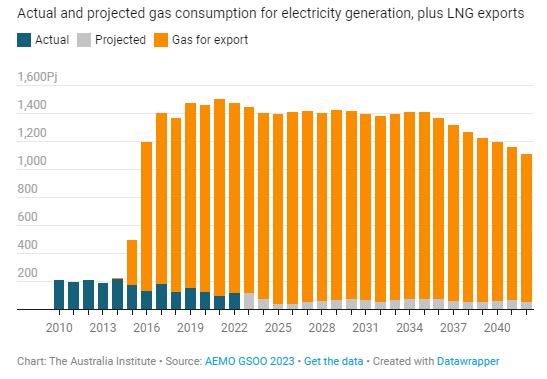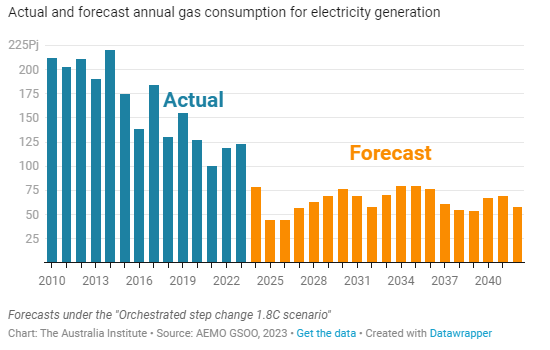
Labor’s federal resources minister Madeleine King sounds a lot like Scott Morrison with her insistence that Australia needs more, not less, gas.
While Morrison’s pitch was a “gas-led recovery”, hers is “a future made in Australia”. To that end, she announced on July 23 that Chevron, INPEX, Melbana and Woodside Energy would be granted new gas exploration permits.
King’s announcement included the phrase that new gas will “firm renewables and support the economy as Australia makes the transition to net zero emissions”.
As The Australia Institute’s (TAI) Stephen Long said after Labor released its Future Gas Strategy in May, “government policy has entered a backward land where logic is reversed”.
Environment groups challenged King’s decision. A day after the hottest day on record, they warned it will fuel climate change and increase pressure on already stressed oceans and marine life.
The Intergovernmental Panel on Climate Change (IPCC) and the International Energy Agency (IEA) are pushing for steep cuts in fossil fuels to have any hope of reaching net zero emissions by 2050.
That means between 2020 and 2050, the supply of coal would have to fall by 99%, oil by 70% and gas by 84% to keep on track with the Paris climate targets.
But Anthony Albanese’s government is ignoring that, agreeing with the fossil fuel corporations that more gas is needed to stem “supply shortfalls” on the east coast.
Climate scientists and energy experts say Labor has been captured by the fossil fuel industry.
Domestic gas consumption falls
TAI has long said Australia has more than enough gas. Its data from last year projects that domestic gas consumption is leveling off, while demand for gas exports rise.
It said if the government bases its projections on “industry participants”, it should not be surprising that fear mongering and recommendations for more investment in gas infrastructure are put.
TAI said even the data contained in Australian Energy Market Operator’s (AEMO) Gas Statement of Opportunities reveals how wrong this argument is.
“Australia is projected to use much less gas for electricity generation than it currently does,” AEMO admits.
The Institute for Energy Economics (IEEFA) said in June that the use of gas on the east coast has been declining for 10 years “and this trend is likely to continue”.
About 80% of eastern Australia’s gas supply is for export, “backed by proven and probable reserves, reducing the need for new gas supplies”.
IEEFA said new gas supplies are not needed in the long term and “more can be done on the demand side to further reduce domestic gas consumption” including helping households and industry electrify and implement energy efficiency upgrades. These could “address supply gaps while reducing energy bills”.
But while public money keeps flowing to fossil fuel corporations, there is no incentive to change: $14.5 billion is being handed over in subsidies, a rise of 13% over 2023–24.
TAI’s analysis in May found that Labor has budgeted $54 billion for fossil fuel subsidies, five times the amount it has committed to its key housing policy — the $10 billion Housing Australia Future Fund.
Investing in failed technology
King also announced new permits for offshore carbon capture and storage (CCS) exploration — a technology that has yet been proven to work, certainly not on the scale required to be effective in mitigating climate change.
Joe Rafalowicz, Greenpeace Australia Pacific, said new carbon dumping permits are “a step backwards”.
Billions of dollars have already been wasted on this technology and it is “a distraction from the clean energy solutions we have available right now”.
“Greedy fossil fuel companies, like Woodside, use every excuse under the sun to keep drilling our oceans for gas — even the magical ‘carbon dumping unicorn’ — but the future lies in proven renewables like wind and solar.”
The IEA and the IPCC have said that, even if CCS worked, there is no justification for new fossil fuel projects in a climate emergency.
“A government that is serious about climate action will stop spending millions of taxpayer funds on carbon dumping, and would instead invest in a just, affordable, rapid clean energy transition.”
Betrayal of climate commitments
Rafalowicz said Labor’s Future Gas Strategy was “a betrayal” of Australian and Pacific communities to deliver accelerated climate action. He called on Labor to make its timeline to implement its transition pledge to COP28 public.
The Australian Marine Conservation Society said King’s plan to dump carbon pollution under oceans threatens our marine life and subsidises the fossil fuel industry to continue.
Permits have been issued for South-Eastern waters which, it said, are “being hit hard by climate change, warming 3–4 times the global average”.
AMCS Oil and Gas Campaign Manager Louise Morris said Labor’s Future Gas Strategy locked Australia and the world into more gas beyond 2025.
The permits for gas exploration and carbon pollution dumping for the waters between Victoria and Tasmania will impact some of the most important areas for our endangered marine life.
Tens of thousands of people oppose seismic blasting and test drilling proposals in the Otway Basin.
Morris said Labor’s carbon dumping permits will allow Esso/ExxonMobil to “repurpose rusting old rigs and infrastructure, which have had two reported leaks and spills just this year, for dumping carbon in Bass Strait”.
The Coalition has already spent more than $1 billion on CCS, which failed to deliver, Morris said. Now Labor plans to “throw another estimated $140 million at this proven failure” over the next 10 years.
Long said there is “scant evidence” for King’s line that by ramping up gas production and exports, Australia is helping Asia shift from coal to clean energy.
He said Labor’s Future Gas Strategy effectively concedes that demand for gas exports will only continue under current policies and that scenarios consistent with committed climate action would lead to much lower demand.

